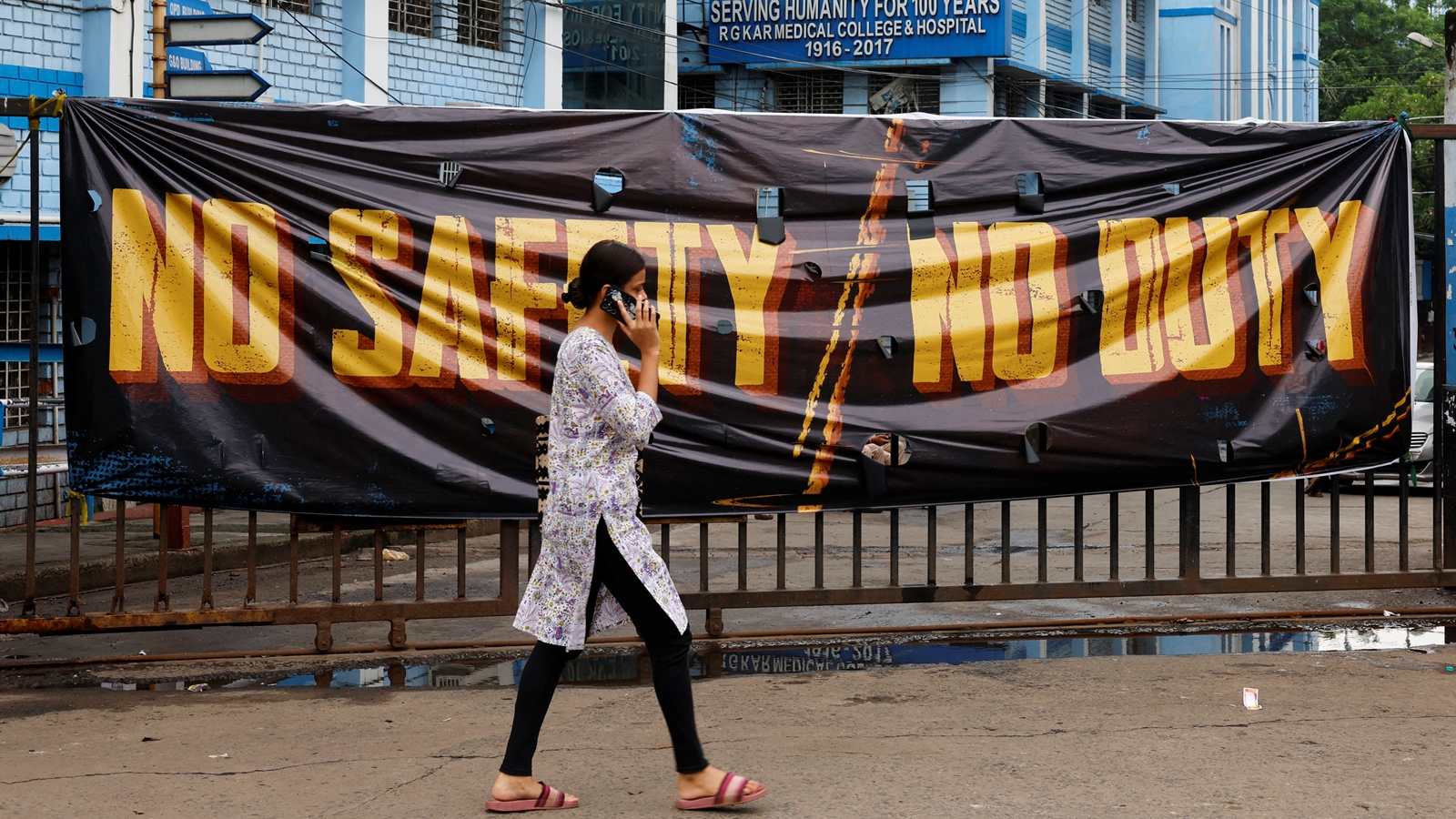Observing that “the nationwide protests” over the “brutal” rape and murder of a junior doctor at the R G Kar Medical College Hospital in Kolkata have brought to “the forefront” the issue of “lack of institutional safety for doctors” and that “the nation cannot await a rape or murder for real changes on the ground”, the Supreme Court constituted a National Task Force (NTF) Tuesday to “formulate effective recommendations to remedy the issues of concern pertaining to” the “safety, working conditions and well-being of medical professionals and other cognate matters”.
The bench of Chief Justice of India D Y Chandrachud and Justices J B Pardiwala and Manoj Misra said the NTF shall suggest appropriate timelines by which its recommendations could be implemented based on the existing facilities in hospitals. The NTF has been asked to submit an interim report within three weeks and the final report within two months.

The nine members of the NTF are Surgeon Vice Admiral Arti Sarin, Director General, Medical Services (Navy); D Nageshwar Reddy, Chairman and Managing Director, Asian Institute of Gastroenterology and AIG Hospitals, Hyderabad; M Srinivas, Director, AIIMS, Delhi; Pratima Murthy, Director, NIMHANS, Bengaluru; Goverdhan Dutt Puri, Executive Director, AIIMS, Jodhpur; Saumitra Rawat, Chairperson, Institute of Surgical Gastroenterology, GI and HPB Onco-Surgery and Liver Transplantation and Member, Board of Management, Sir Ganga Ram Hospital, New Delhi; Anita Saxena, Vice-Chancellor, Pandit B D Sharma Medical University, Rohtak; Pallavi Saple, Dean, Grant Medical College and Sir JJ Group of Hospitals, Mumbai; and Padma Srivastava, Chairperson of Neurology at Paras Health, Gurugram.
The NTF ex-officio members will be the Cabinet Secretary, Union Home Secretary, Union Health Secretary, Chairperson, National Medical Commission, and President, National Board of Examinations.
The NTF will prepare an action-plan under the heads preventing violence, including gender-based violence against medical professionals; providing an enforceable national protocol for dignified and safe working conditions for interns, residents, senior residents, doctors, nurses and all medical professionals.
To prevent violence, the action plan shall address issues like ensuring due security in medical establishments including preventing intoxicated persons from entering the premises of the medical establishment, unless they are patients; infrastructural development such as provision of separate resting rooms and duty rooms in each department for male and female doctors, male and female nurses; and a gender-neutral common resting space.
It shall also explore constitution of “Employees Safety Committees” comprising doctors, interns, residents and nurses at every medical establishment to conduct quarterly audits on institutional safety measures and ensuring compliance of the Sexual Harassment of Women at Workplace (Prevention, Prohibition and Redressal) Act, 2013.
Story continues below this ad
The Supreme Court clarified that the phrase medical professionals used in the order encompasses every medical professional including doctors, medical students who are undergoing their compulsory rotating medical internship as a part of the MBBS course, resident doctors and senior resident doctors and nurses including nursing interns.
“Medical Associations have consistently raised issues of the lack of workplace safety in health care institutions. Medical professionals in the performance of their duties have been unfortunate targets of various forms of violence. Hospitals and medical care facilities are open throughout the day and night. Medical professionals – doctors, nurses and paramedic staff – work round the clock. Unrestricted access to every part of healthcare institutions has made healthcare professionals susceptible to violence. Patients of relatives in anguish are quick to attribute untoward results to the negligence of medical professionals. Such allegations are immediately followed by violence against medical professionals,” it said.
Highlighting incidents of attacks on doctors in different parts of the country, the bench said these “are portents of a systemic failure to protect doctors, nurses and para medical staff in the confines of hospitals. With few or no protective systems to ensure their safety, medical professionals have become vulnerable to violence”.
It said “women are at particular risk of sexual and non-sexual violence in these settings. Due to ingrained patriarchal attitudes and biases, relatives of patients are more likely to challenge women medical professionals. In addition to this, female medical professionals also face different forms of sexual violence at the workplace by colleagues, seniors and persons in authority. Sexual violence has had its origins even within the institution, the case of Aruna Shanbaug being a case in point”.
Story continues below this ad
The bench pointed out that “there is a hierarchy within medical colleges and the career advancement and academic degrees of young professionals are capable of being affected by those in the upper echelons. The lack of institutional safety norms at medical establishments against both violence and sexual violence against medical professionals is a matter of serious concern”.
It said “while gendered violence is the source of the more malevolent manifestations of the structural deficiencies in public health institutions, the lack of safety is of concern to all medical professionals. Preserving safe conditions of work is central to realising equality of opportunity to every working professional”.
It said “as more and more women join the workforce in cutting edge areas of knowledge and science, the nation has a vital stake in ensuring safe and dignified conditions of work. The constitutional value of equality demands nothing else and will not brook compromises on the health, well-being and safety of those who provide healthcare to others”.
The order referred to legislation in various states dealing with violence against medical professionals and said these enactments, however, “do not address the institutional and systemic causes that underlie the problem. An enhanced punishment without improving institutional safety standards falls short of addressing the problem effectively”.
Story continues below this ad
It said “we have in this backdrop formed the view that a national consensus must be evolved – after due consultation with all stakeholders – on the urgent need to formulate protocols governing the issues which this order has highlighted”.








